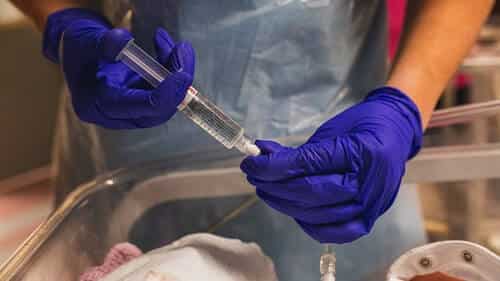
Were you or your unborn baby the victim of medical malpractice that led to a birth injury? Did the obstetrician make an error that led to neonatal infection and a sepsis birth injury?
The personal injury attorneys at Rosenfeld Injury Lawyers handle medical negligence cases and can serve as your legal advocates.
Call our birth injury lawyers today at (888) 424-5757 (toll-free phone call) or use the contact form to schedule a free case evaluation to discuss your family’s legal rights concerning your baby’s neonatal infection birth injury. Let us review your confidential or sensitive information and seek justice on your behalf.
Immediately following birth is a dangerous time when many things can go wrong and cause injury to a newborn, especially if the hospital staff fails to monitor the child properly.
Bacterial infections are common in infants due to their weak immune systems, and special consideration must be taken to ensure that the delivery and post-delivery environments are kept clean and free of contaminants that can cause an infection.
In some cases, these infections are avoidable and may result from the medical malpractice of the healthcare provider. When that is the case, you may file a malpractice claim for medical negligence.
Neonatal Infection Birth Injury Attorneys Helping Your Family
Rosenfeld Injury Lawyers LLC represents clients who have been victims of medical malpractice that have resulted in undue harm to children during or after birth. Our personal injury lawyers are available to fight on your behalf to recover the compensation you are entitled to receive.
We will obtain the necessary medical records and work with medical experts to help you file your case.
If your newborn has contracted a bacterial infection, give us a phone call or fill out a contact form for your free consultation. We can help you hold medical professionals accountable for their negligence.
Causes of Neonatal and Post-Natal Infections
Newborn babies are born with weakened immune systems, making it instrumental to take every measure possible to prevent and detect an infection quickly. Rapid detection of infections can prevent problems that cause severe life-threatening complications.
Common causes of infection in newborns include the following.
- An unclean delivery environment for a pregnant woman
- Contaminated equipment used during or after delivery
- Inadequate or infrequent measures taken to keep the newborn clean
- Lack of proper testing and evaluation for infection or accompanying symptoms
When not properly treated, infections can cause serious long-term harm and affect the development of the child. The infant may end up in the neonatal intensive care unit with neonatal sepsis. In a worst-case scenario, this can develop into septic shock.
If infection results in a condition that permanently changes the child’s quality of life, the family deserves to be compensated for the cost of caring for the child’s unique needs over their lifetime.
Types of Neonatal Infections
While measures are constantly being taken to make hospital environments sanitary, it is unfortunate that medical centers are home to some of the strains of bacteria and fungus due to their development of resistance to strong antibiotics and other pharmaceuticals.
Common neonatal infections found in newborns include the following.
- Streptococcus, otherwise known as Group B Strep (blood tests can often detect group B streptococcal infections)
- Escherichia coli
- Neonatal Meningitis (Meningitis can be diagnosed through a spinal tap or lumbar puncture)
- A fungal infection (Candidiasis)
- Conjunctivitis— otherwise known as pink eye
- Sepsis— an infection of the blood
- Herpes simplex virus
Very low birth weight infants with infectious diseases that affect the brain and spinal cord could suffer brain damage, developmental problems, cerebral palsy, or death. Newborns must be closely monitored for signs of an infection or neonatal sepsis.
Early treatment can prevent severe complications that arise from these severe infections, and it is the lack of proper monitoring, diagnostic tests, or a quick response that can make a difference for the worse.
If not treated promptly, the child will likely need to spend time in the intensive care unit. In addition, when a newborn spends time in the pediatric NICU, it can have long-term health effects.
Failure to detect or treat an infection in a newborn or “in utero” the medical staff may be considered an act of negligence or medical malpractice if it is determined that the hospital staff did not take proper measures to prevent or treat the condition despite the common risk factors.
Certain pregnant women are more likely to deliver a child who is at risk of infection. In addition, premature babies are also at a higher risk of neonatal infections.
Early-Onset Neonatal Sepsis: Contributing Risk Factors
Early-onset neonatal sepsis typically develops within the first 0 to 3 days of life after childbirth. The condition is an acquisition of microorganisms transferred from the mother through a transplacental spread or hematogenous infections associated with sepsis, fever, chills, and malaise.
Most commonly, early-onset sepsis birth is the result of ascending infection from the cervix during childbirth. Important risk factors associated with neonate sepsis include:
- Very low birth weight infants
- Premature birth
- Maternal febrile illnesses
- Chorioamnionitis – A severe bacterial infection of the chorion and amnion membranes surrounding the fetus
- Prolonged rupture of membranes (PROM)
A premature rupture of membranes (PROM) involves breaking open (rupturing) the amniotic sac membranes before labor starts. A premature rupture during preterm is a significant health concern caused by chorioamnionitis, a severe infection of the placental tissues.
The infection can be dangerous for the mother and baby, primarily if placental abruption (placenta detaching from the uterus early) occurs from a cesarean birth, umbilical cord compression, or postpartum (after delivery) infection.
Certain risk factors, like acquiring Group B streptococcus (GBS), are the most common etiologic (causation-related) agents involved in early-onset sepsis birth. Also, Escherichia coli is the most common cause of early-onset neonatal infection-related mortality.
Some newborn infants acquiring neonatal sepsis will acquire bacterial Meningitis or bacteremia within the first 72 hours after birth, requiring hospitalization in NICU (neonate intensive care unit). In addition, within the first three days after birth, the bacterial pathogens transmitted from the mother to the infant before and during delivery can cause early-onset sepsis.
Extremely low birth weight infants, especially preterm infants, within the first few days of life have an immature immune system compared to a full-term baby, creating an increased risk of acquiring severe neonatal infection or sepsis. In addition, premature newborns lack specific protective antibodies that can fight certain bacteria causing sepsis because their birth came before receiving antibodies from the mother.
Late-Onset Neonatal Sepsis: Contributing Risk Factors
Within the first week or so after birth, newborns can develop late-onset neonatal sepsis, typically required from the environment. Preterm newborns (premature infants) are particularly prone to developing late-onset sepsis due to prolonged hospitalizations, IV catheters, and the use of intravenous antibiotics.
Approximately 10 to 15% of neonates develop late-onset sepsis with nonspecific or subtle signs of neonatal infections.
The signs and symptoms of sepsis include:
- Body temperature changes
- Bradycardia
- Breathing problems
- Developmental delay
- Diarrhea
- Hemorrhagic rash
- Hypoglycemia (low blood sugar)
- Impaired neurodevelopmental disabilities
- Jaundice (yellow skin and whites of the eyes)
- Reduced movements
- Reduced sucking
- Respiratory distress
- Seizures
- Swollen abdomen
- Vision impairment
- Vomiting
The child may experience an elevated heart rate of 160 bpm or more. The tachycardia (elevated heart rate) usually lasts 24 hours before an acute condition other than late-onset sepsis develops.
Doctors typically treat late-onset or nosocomial sepsis with intrapartum antibiotic prophylaxis. The treatment of neonatal sepsis includes an early diagnosis followed by antibiotic treatments including Vancomycin, Gentamicin, and Cefotaxime.
Any physician that misses the risk factors are early signs of sepsis, and gram-negative bacteria increases the baby’s mortality risks. Residual neurologic damage happens in approximately 30% of all neonates that acquire septic Meningitis. The neonatal sepsis mortality rate can be as high as 50% for newborns who are not adequately treated.
In-hospital physicians, pediatricians, and obstetricians are essential in managing advanced treatment to combat neonatal sepsis and make adjustments when required, especially with recent changes in antibiotic resistance. In recent years, antibiotic resistance has affected group B strep, the leading contributing factor in developing early in the late-onset sepsis birth.
Diagnosing Neonate Sepsis
A physician might want to order a molecular diagnostic blood test to identify any sepsis microorganism in the newborn’s blood quickly. Unfortunately, many hospitals do not offer the test to their physicians to help diagnose neonatal sepsis due to the high cost of laboratory testing.
Molecular diagnostic blood testing results are invaluable during an evaluation of neonatal sepsis in isolating the presence of bacteria, high blood pressure, or other conditions placing the mother and baby at risk.
Instead, the doctor will rely on blood cultures from the baby, including a complete blood count (CBC) test. The doctor might also test for any sign of inflammation before prescribing an antibiotic, including ampicillin in conjunction with cefotaxime or gentamicin.
However, medical science recommends not prescribing cefotaxime in newborns with liver issues, severe renal impairment, or gallbladder disease because it can cause hemolytic anemia, where red blood cells burst.
File a Medical Malpractice Claim on Behalf of Your Child With a Neonatal Infection Birth Injury
Did your child suffer from suspected sepsis brought on by an untreated infection? You or your family member might be entitled to receive compensation to cover their medical expenses, pain, and suffering.
Rosenfeld Injury Lawyers LLC specializes in birth injury malpractice cases and has successfully represented clients just like you in claims against healthcare providers.
Contact us today for a free consultation and legal advice so that we can evaluate your case and let you know more about your legal rights. Our Illinois medical malpractice law firm is located in Chicago, but we will come to you if you cannot come to us to discuss your child’s birth injuries.
Our law firm works on a contingency fee basis, meaning that we accept payment for our services only after resolving your case through a negotiated settlement offer or jury verdict.
All confidential or sensitive information you share remains private through an attorney-client relationship. In addition, our entire team of birth injury attorneys currently follow CDC (Centers for Disease Control and Prevention) Covid-19 (coronavirus pandemic) social distancing guidelines to ensure our client’s safety.
Many medical malpractice cases have already been resolved through million-dollar settlements to ensure families have sufficient financial compensation for providing all the treatment and care their child requires.







